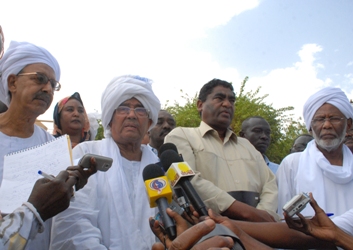Sudanese opposition to protest against increase in fuel prices
June 12, 2012 (KHARTOUM) — Sudan’s opposition National Consensus Forces (NCF) agreed to launch a large scale campaign of protests against the removal of oil subsidies. It further discussed an interim constitution to rule the country once the regime collapses.

NCF forces held a meeting on Tuesday in the Sudanese capital to discuss ways to mobilise the Sudanese street against this economic measure which will lead to increase inflation and poverty among the already vulnerable population.
The six hour meeting also discussed a three year transitional programme to rule the agitated country if their efforts to topple down the regime succeed.
Speaking to the press after the meeting, NCF leader Farouk Abu Eissa, said they decided to warn the National Congress Party against increasing the prices of fuel and demand to reduce the extravagant expending on the large government institutions.
He said the opposition is determined to prevent the government from implementing the new measures which he described as a war against the people.
“We will repel and kill those who dare to attack the people before they kill them,” Abu Eissa said.
Hassan Al-Turabi, leader of the Popular Congress Party, said this meeting should be the kick-off a campaign to confront the regime which continues to oppress the people, stressing that the current economic crisis affects the rich and poor alike.
“The middle class began to recede after the intensification of poverty and inflation. Therefore the opposition leaders met to plan for the after this regime,” he said.
He further said the coming days will witness the beginning of strong opposition campaign to confront the government in all the villages and states of Sudan. He emphasized on the need to direct energies to remove what he called the “deceased regime”.
The Islamist leader who was seen as godfather of the regime before to split in 1999, rejects any compromise with the ruling National Congress Party (NCP), as he considers regime change the only alternative for the country.
He and the other opposition forces including Umma party believe that a political change should take place in the country to reconcile with the South Sudan and end current conflicts in South Kordofan, Blue Nile and Darfur.
Civil disobedience and protests are seen as experimented means to achieve this change as it was the case in 1964 and 1985.
However, the political parties disagree over the role rebel groups can play in this change. But all of them agree on the rebels’ participation as political forces in the after regime.
Abu Eissa who is an independent figure said the meeting discussed extensively preparation for the post-regime period and approved the programme of interim government that will lead the country during three years.
He pointed out in a press conference he held later that the interim constitution and the transitional programme are not definitive but will be discussed during the next stage with “all the political forces in the country”.
He however said a meeting of the opposition leaders will be held on 26 June to sign the two texts.
Abu Eissa stressed that the opposition has no choice but to move on in order to get rid of the ruling regime which led the country into poverty, adding that “the next revolution will not be a revolution in Khartoum will be a revolution of the states.”
On Monday, Nafie Ali Nafie, presidential assistant and NCP deputy chairman minimized the negative impact of unpopular measures. He stressed that these reforms are the only way to restore the recovery of the national economy and to bridge the gap between revenue and expenditures.
On Tuesday, Hamid Sidiq, secretary of organization sector in the ruling party , said the NCP does not want to fool the people but is keen to expose courageously the economic situation in a transparent manner.
The party welcomes any proposed solution if it is convincing, he added.
Khartoum based Alray Alaam newspaper reported that Sudanese president Omer al-Bashir would announce a series of measures in a speech to the nation very soon.
The expected measures would include reduction of the salaries of ministers and Mps and other high ranking officials. It is also expected to reduce the number of ministries and federal and regional institutions.
However presidential adviser Mustfa Osman Ismail, said in a separate statement that the reduction of 30% of federal and regional institutions will only spare five million Sudanese pound (1 dollar = 5 pounds).
(ST)
